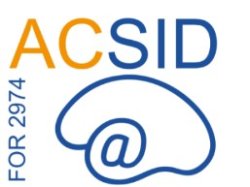In our current research projects, we investigate the influence of stress and its physiological mediators on extinction learning (SFB 1280), memory consolidation and perceptual processes (SFB 874), episodic memory (FOR 2812), quality of emotional memories, memory retrieval in dependence of sex hormone status as well as cognitive emotion regulation (DFG-Projects) using behavioral, pharmacological, psychophysiological and neuroimaging techniques. Below, you can find a detailed description of each project.

Project A09: Stress hormone effects on contextualized extinction memories
During the first funding period of the SFB 1280, we investigated the impact of stress hormones on extinction consolidation and extinction retrieval. Our results indicate that stress hormones timing-dependently modulate the strength and context-dependency of extinction memories, resulting in either return of fear or not (Stress Timing affects Relapse/STaR model; Meir Drexler et al., 2019). The identification of novel viable, stress hormone-associated strategies to enhance the long-term expression of extinction memories and to reduce the return of fear remains an important endeavor.
In the second funding period, we will systematically compare the timing-dependent effects of psychosocial stress vs. physical exercise on extinction memories, renewal and context generalization and elucidate the mechanisms by which these effects occur. Thus, these studies will critically expand our STaR model to more ecologically valid as well as to healthier, more positively experienced situations and to more contextualized and thus clinically more relevant retrieval processes. In order to reduce the cortisol-associated return of fear as proposed in the STaR model, we will examine the effects of multiple extinction contexts during fear extinction training. In addition, we aim to elucidate the neural correlates of cortisol effects on contextualized retrieval of categories in a virtual reality task using functional magnetic resonance imaging.
Taken together, these studies will enhance our mechanistic understanding of the modulation of extinction memories by stress hormones, an area of high relevance for basic science and clinical applications alike.
Contact: Prof. Dr. Oliver Wolf, Prof. Dr. Christian Merz, Dr. Valerie Jentsch, Katharina Beck, Lianne Wolsink, Jael Caviola

Project B4: Memories of a Stressful Episode
Stress is known to enhance memory consolidation through the interdependent action of the stress hormones (nor)adrenalin and cortisol. However, what exactly we remember from a stressful episode itself had not been tested in an experimental setting in humans. Studies conducted in our department have demonstrated that stressed participants remember visual items as well as an ambient odour better compared to participants undergoing a stress-free control condition. Moreover, their recognition memory relied more on hippocampal based recollection processes. Furthermore, we could show that olfactory stimuli are effective reminder cues for memories of stressful but not of non-stressful situations. These findings demonstrate that stress enhances memory consolidation and that olfactory stimuli are powerful reminder cues of stressful memories.
Our current studies try to provide a mechanistic understanding of these findings. The role of visual exploration in a stressful situation, measured with eye tracking and stress neuromodulators (cortisol and noradrenalin), is investigated. Possible distinct effects of stress and the stress hormone cortisol on recollection versus familiarity will be investigated for memory consolidation and memory retrieval using behavioural and neuroimaging techniques. The role of olfactory reminder cues will be systematically compared with visual and auditory cues using emotional and neutral stimuli.
Furthermore, effects of stress on hippocampal based perceptual processes will be tested in collaborative experiments. Previous studies demonstrated that the visual perception of spatial scenes relies on the hippocampus, while perceiving objects and faces is hippocampus-independent. Current and future studies investigate to what extent visual perception is influenced by stress and aim to reveal the underlying neural mechanisms of this influence.
Last but not least the impact of stress and stress hormones on non-hippocampal based (cortical) perceptual learning processes will be tested in collaborative experiments.
Together, these studies will lead to an enhanced mechanistic understanding of the enhancing and impairing effects of stress on the representation of sensory processes.
Contact: Tobias Rüttgens, Lena Pfeifer, Prof. Dr. Oliver T. Wolf

Project P4: The Competition of Semantic Information and Episodic Experiences and it’s Modulation by Stress
The main prediction of the scenario model proposed in the framework of the research unit FOR2812 is that a scenario of an episode is constructed by retrieving the gist of the episodic memory and supplementing missing information from semantic memory. The neural correlates, as well as the underlying mechanisms of the balance between the two memory systems are incompletely understood. The goal of the present project is to test the prediction of the scenario model experimentally and provide a better understanding of the neural mechanisms underlying scenario reconstruction. By the use of a virtual environment with an implemented memory task we will induce a realistic episodic memory. As stress is well known to modulate episodic memory formation and retrieval, it allows us to disentangle the relative contribution of the two memory system during scenario construction. Using fMRI, the effects of the stress hormone cortisol on the memory task and their neural correlates will be investigated.
Contact: Nicole Klein, Henry Soldan, Carina Zöllner, Nurten Genc, Prof. Dr. Oliver T. Wolf

The Research Unit focuses on the most prominent predominantly online addictive behaviors, namely gaming, pornography use, buying-shopping, and social-networks use. Based on a theoretical model, we aim to investigate the involvement of the (bio)psychological processes, in particular affective and cognitive mechanisms, involved in the development and maintenance of predominantly online addictive behaviors. A cross-sectional comparison of individuals with recreational/non-problematic use, risky use, and pathological use of specific Internet applications together with a follow-up investigation, will allow for the identification of concomitants of the development of a predominantly online addictive behavior. One central characteristic of the Research Unit is that we will investigate participants at several sites using the same core battery of experimental paradigms, neuropsychological tasks, questionnaires, biomarkers, and ambulatory assessment, and including a follow-up survey. By investigating the hypotheses regarding the involvement of affective and cognitive mechanisms in Internet-use disorders (IUD) in the Research Unit, we will not only contribute to a better scientific understanding of the psychological processes of IUD, but we can also contribute to clinical applications.
The Department of Cognitive Psychology (OT Wolf) contributes to two sub-projects (RP4 & RP5) were we investigate in collaborations with colleagues from Bochum, Duisburg and Hannover the impact of stress on addiction related behavior.
Contact Person: Prof. Dr. Oliver T. Wolf

DFG-ORA Project (WO 733/17-1): Stress effects on Memory Accuracy versus Generalisation
Stress is known to enhance memory consolidation, but there is no good understanding of how it affects the quality of memories. Human studies have reported both, enhanced generalization and enhanced accuracy of emotional memories. In close collaboration with our colleagues from the Donders Institute for Brain, Cognition and Behaviour in Nijmegen (Profs Roozendaal, Henckens, and Hermans) we test a new model postulating differential effects of the stress hormones noradrenaline and cortisol. For this purpose, we combine in this interdisciplinary project human behavioural, pharmacological and neuroimaging studies with mechanistic studies in rodents.
Contact: Lianne Wolsink, Dr. Lisa Wirz, Prof. Dr. Oliver T. Wolf
DFG-Project (WO 733/15-1): Stress and Cognitive Emotion Regulation Processes
The ability to cognitively regulate emotions is of vital importance for us humans. A deficient ability to adaptively regulate one’s (negative) emotion is regarded a major risk factor for the development of mental disorders. Acute psychological stress causes the release of stress hormones (e.g. noradrenalin and cortisol) which influence brain function. Emotionally stress is associated with an increase in negative affect and an enhanced susceptibility to distraction by emotional stimuli. The goal of the present project is the investigation of acute and delayed stress effects on the efficacy of emotion regulation using different cognitive strategies. In addition the presence of sex differences will be characterized. The results of this project will contribute to a better understanding of the impact of stress and stress hormones on emotion regulation processes.
Contact: Dr. Katja Langer, Dr. Valerie Jentsch, Prof. Dr. Oliver T. Wolf
DFG Project (ME 3831/5-1): Genomic and Non-Genomic Cortisol Effects on Memory Retrieval Dependent on Sex Hormone Status
This project explores the effect of time-dependent effects of cortisol administration on the neural correlates of memory retrieval in a group of healthy men, women across different stages of their menstrual cycle and women taking oral contraceptives. The findings of these studies will contribute to a better understanding of the neurobiological foundations underlying stress and sex hormone effects on memory retrieval and how they might pave the way to memory retrieval deficits. It is funded by the German Research Foundation (DFG).
Contact: Lisa Pötzl, Prof. Dr. Christian Merz